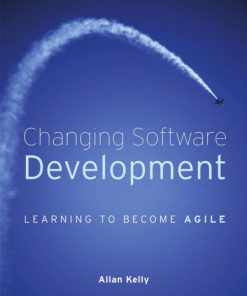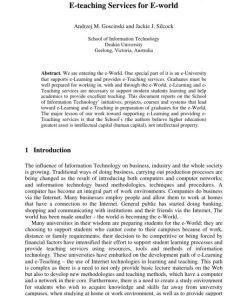The Business Case For E Learning 1st Edition by Tom M Kelly, Nader Nanjiani ISBN 1587200864 9781587200861
$50.00 Original price was: $50.00.$25.00Current price is: $25.00.
Authors:Tom Kelly,, Nader Nanjiani , Series:Computer Science [338] , Author sort:Tom Kelly,, Nader Nanjiani , Ids:1587200864 , Languages:Languages:eng , Publisher:Cisco Press , Comments:Comments:Published October 19, 2004, 216 pages.
The Business Case For E-Learning 1st Edition by Tom M Kelly, Nader Nanjiani – Ebook PDF Instant Download/Delivery. 1587200864, 9781587200861
Full download The Business Case For E-Learning 1st Edition after payment

Product details:
ISBN 10: 1587200864
ISBN 13: 9781587200861
Author: Tom M Kelly, Nader Nanjiani
Realize productivity gains from network-driven communication, training, and assessment
What sets apart The Business Case for E-Learning?
- Unified approach to e-learning. Covering knowledge sharing, training, and assessment. E-learning components such as online testing and certifications are uniquely combined.
- Productivity. The cause for rather than a consequence of e-learning. The Business Case for E-Learning demonstrates cases and methods in e-learning to those seeking productivity advantages for their organizations and ecosystems.
- Focus on ecosystem. Those seeking productivity advantages across the entire supply chain or value chain of delivery can benefit from the presented perspective.
- Recommendations go beyond organizational gains to cover resellers and customers.
- Results and returns. See case studies and empirical evidence of the value and return on investment (ROI) that demonstrate the success of a cohesive e-learning program. Learn how Cisco Systems saved $142 million in one year using e-learning.
I have always truly believed that the Internet and education are the two great equalizers in life, and this book provides information about how to combine the two for productivity and profitability gains, based on real successes.
-John Chambers, President and CEO of Cisco Systems
The Business Case for E-Learning is the first book that demonstrates the productivity gains provided by Internet learning through a unique approach combining e-communication, e-training, and e-assessment. Beyond theory, The Business Case for E-Learning is based on practical experience in developing and deploying programs that bolster profitability. This book offers you practical recommendations for best practices and return on investment and provides lessons learned from real-world experiences.
The Business Case for E-Learning presents several case studies that range from the challenges of learning in Africa to the emergence of corporate knowledge-sharing communities. Case studies on Toyota, BearingPoint, Element K, and other e-learning leaders demonstrate how e-learning best practices can yield value for any organization. One case study quantifies how Cisco Systems in one year generated $16 in value for every dollar spent on an e-learning program.
Managers need to prove to companies that an e-learning program can result in demonstrable productivity gains. Through The Business Case for E-Learning, you learn to avoid unnecessary trial and error with e-learning and take advantage of the e-learning experience documented by authors Tom Kelly and Nader Nanjiani.
You can visit the companion website for The Business Case for E-Learning at www.cisco.com/go/book/elearning.
This volume is in the Network Business Series offered by Cisco Press. Books in this series provide IT executives, decision makers, and networking professionals with pertinent information about today’s most important technologies and business strategies.
The Business Case For E-Learning 1st Table of contents:
Part 1: Understanding E-Learning
-
What is E-Learning?
- Definition and Types of E-Learning
- E-Learning Delivery Methods: Synchronous vs. Asynchronous
- E-Learning Platforms and Technologies
-
The Evolution of Learning in the Workplace
- The Shift from Traditional Learning Methods
- How E-Learning is Changing Corporate Training
- The Role of Learning Management Systems (LMS)
Part 2: The Business Case for E-Learning
-
Cost Savings and Efficiency
- Reducing Training Costs with E-Learning
- Time and Resource Efficiency Gains
- Scaling Training Across Locations
-
Improving Learning Outcomes
- Enhancing Learner Engagement with E-Learning
- The Effectiveness of Online Learning vs. Traditional Methods
- Measuring the Impact of E-Learning on Performance
-
Aligning E-Learning with Business Goals
- How E-Learning Supports Organizational Objectives
- E-Learning as a Tool for Talent Development
- Building a Culture of Continuous Learning
Part 3: Implementing E-Learning in Your Organization
-
Building the Case for E-Learning to Stakeholders
- Presenting the ROI of E-Learning
- Overcoming Common Obstacles to E-Learning Adoption
- Engaging Senior Management and Key Decision Makers
-
Choosing the Right E-Learning Solution
- Factors to Consider When Selecting E-Learning Tools
- Customizing E-Learning to Meet Organizational Needs
- Integration with Existing Systems
-
Planning for Successful E-Learning Implementation
- Steps for a Smooth Rollout
- Training Administrators and Support Teams
- Ensuring Scalability and Flexibility
Part 4: Evaluating E-Learning Impact
-
Measuring E-Learning Success
- Key Performance Indicators (KPIs) for E-Learning
- Tools for Tracking Learner Progress and Outcomes
- Analyzing Business Results Post-Implementation
-
Feedback and Continuous Improvement
- Collecting Feedback from Learners and Stakeholders
- Using Analytics to Improve Learning Programs
- Evolving Your E-Learning Strategy for Long-Term Success
People also search for The Business Case For E-Learning 1st:
the business case for e-learning
the business case for learning
business case for e-learning
the business case for emotional intelligence
the business case for emotional intelligence pdf
You may also like…
eBook PDF
Changing Software Development Learning to Become Agile 1st Edition by Allan Kelly ISBN 9780470725313












